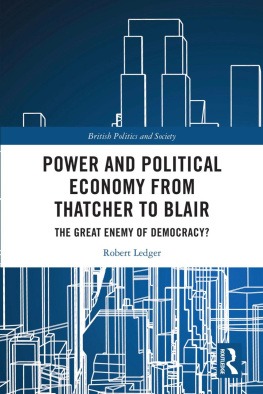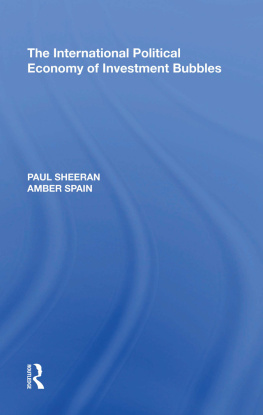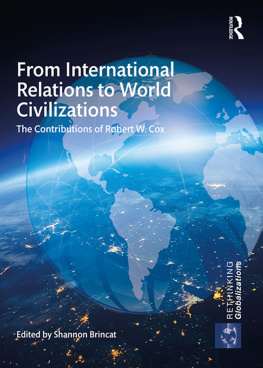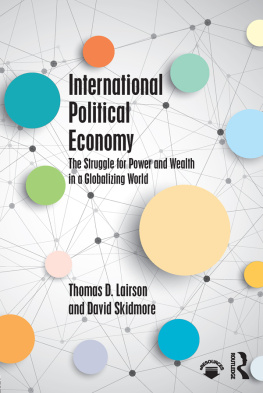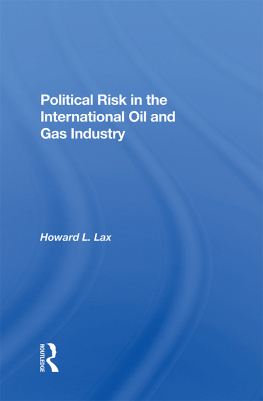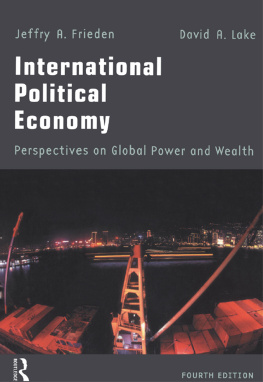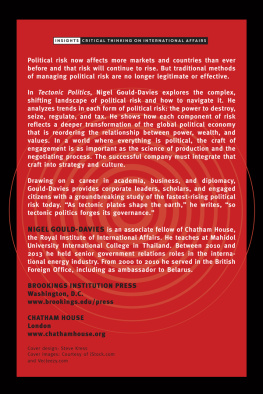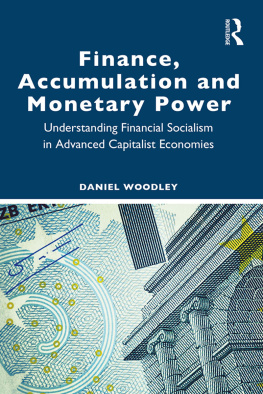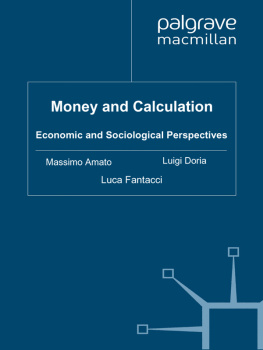THE INTERNATIONAL POLITICAL ECONOMY OF RISK
The International Political Economy of Risk
Rationalism, Calculation and Power
Robert Deuchars
First published 2004 by Ashgate Publishing
Reissued 2018 by Routledge
2 Park Square, Milton Park, Abingdon, Oxon OX14
4RN 711 Third Avenue, New York, NY 10017, USA
Routledge is an imprint of the Taylor & Francis Group, an informa business
Robert Deuchars 2004
Robert Deuchars has asserted his right under the Copyright, Designs and Patents Act, 1988, to be identified as author of this work.
All rights reserved. No part of this book may be reprinted or reproduced or utilised in any form or by any electronic, mechanical, or other means, now known or hereafter invented, including photocopying and recording, or in any information storage or retrieval system, without permission in writing from the publishers.
A Library of Congress record exists under LC control number: 2004007700
Notice:
Product or corporate names may be trademarks or registered trademarks, and are used only for identification and explanation without intent to infringe.
Publishers Note
The publisher has gone to great lengths to ensure the quality of this reprint but points out that some imperfections in the original copies may be apparent.
Disclaimer
The publisher has made every effort to trace copyright holders and welcomes correspondence from those they have been unable to contact.
ISBN 13: 978-0-815-39789-2 (hbk)
ISBN 13: 978-1-351-14632-6 (ebk)
I am very grateful to those who have assisted me in completing this we Professor Ralph Pettman gave me invaluable advice and was always available discuss problems I had with the book, despite his own heavy workload. I deeply indebted to Trevor Bradley for providing me with a wealth of material and for always being a constructive critic. I also thank Dr Kate Macmillan, Dr Kosu Shimizu and Simon Liddell for their useful and constructive comments on easy drafts of this book. My thanks also to Professor Ian Culpitt and Professor Vendu Kublkov for their contructive comments. Thanks to Dr Timothy Sinclair permission to use his 1994 ISA paper. An earlier version of would presented at the Second Wellington Conference on World Affairs and included Rights, Rules Responsibilities in International Conduct, 2000, Russell Solomon (ed,), Dunmore Press, copyright Victoria University Press. Used with permission
Part of this work was incorporated into an Honours paper and I am also grateful to my students for helping me to clarify much of my thinking. I am especially thankful to John Pennington, Alan Cockerill, Seth Bateman, Kinglsey Edne Fergus Coyne, Sarah Duignan, Michelle Lake, Mary Hay, Jessica Edward Michael Appleton, Dave Broomhall, Nick Henry, Greer Harding, Leigh Mitchell and Matt Nippert.
And finally, and most importantly, I thank my parents, Bernadette O'Gorman and Mei O'Gorman, for their support and encouragement without which this we would not have been completed.
Robert Deuchars
2004
The project of which this book is the end result was brought about by a deep sense of suspicion and mistrust with one of my former jobs as a risk analyst and project risk manager. Suspicion that risk analysis was poorly understood and situated within a world-view that appeared to be imbued with abstraction, enumeration and the production of quantifiable 'facts'. Mistrust in the world of quantitative models and the production of classifiable risks that had the appearance of objectivity and therein lay the problem, namely the introduction of objectivity into a subjective set of problematics. The purpose of what I attempt to say here is not to provide a history of risk and its associations with probability theory nor is it an attempt to provide definitive answers to the question of risk in modernity. Rather it is an attempt to highlight some major omissions in the field of International Political Economy in general and to clear the way for future research in an area that probably should have a degree of centrality in this field.
To that end I have had to step well beyond the boundaries of International Relations in general and International Political Economy in particular. I have scurried around many other disciplines looking for clues into the way risk presents itself to western modernity. I discovered many fruitful avenues in areas such as criminology, anthropology, cultural studies, economics and sociology. Perhaps more interestingly, fields such as accounting and auditing, credit-rating, statistics and insuring yielded many insights into the way we confront risk and attempt to regularise what is after all, as I argue, an article of faith. Risks are not real in any meaningful sense of the word but they do become real. Consider a very simple example. Deep vein thrombosis has been with us since long distance high altitude flight but only in the past few years has it become well-known as a risk. There is a political economy of this phenomenon known as 'economy class syndrome'. You can now pop into your local pharmacy and purchase specially designed arm and leg covers to protect you from this risk. The phenomenon has also become entangled with insuring and politicised with airlines being lobbied to provide better quality information to passengers, not to mention legroom for this risk.
This book attempts to traverse various narratives of risk, taking as its departure point the Italian Renaissance in general and the work of Machiavelli in particular. The confrontation between Fortuna and virt highlighted in the Prince in particular served as a very useful vehicle into what is undoubtedly a vast field of inquiry. I then tell many stories about risk in western modernity, its associations with the ideology of rationalism, enumeration, various calculative practices and the relationship between risk and power/knowledge to borrow Foucault's term. In the second half of the book I focus on narratives of risk and governance in the international financial arena but always sidestepping along the way into state-making, market-making and self-making. Risk as a field of enquiry necessitates these forages into the three major dimensions to contemporary world affairs. If this book resonates with those equally suspicious and mistrustful of what we think we know about risk then it will have served its purpose. I am especially grateful to Professor Ralph Pettman for convincing me that this book should and could be written in the way it was.
The discipline of International Relations (IR) has long concerned itself with questions about war and peace, diplomacy and alliances. For many years its primary focus was exclusively on the relations between states, as these stand in an anarchic states-system. As a discipline it was dominated by politico-strategic realism.
Analysts of International Political Economy (IPE), on the other hand, tend to consider the interaction between international politics and international economics and the implications of this interaction for global power and wealth. Their primary foci are issues such as trade, production, investment, labour and economic strategy. As a discipline IPE is dominated by politico-economic realism.
Much of the work in IPE treats the global political economy as a series of interactions between states and markets, cast in abstract and reified terms. Questions about power tend to be treated in an abstract and reified way as well. There also appears to be a tacit acceptance to consider questions of power in the world political economy in terms of a capacity model. For traditional IR this means military power, productive power, and to a lesser extent ideological power. In IPE, however, this means state power versus the power of the firm in general, and transnational firms in particular. Many questions are asked about where this power is located, and if this power is being lost by the state to the firm. Rather less emphasis is placed on human practices, though, and even less on the social implications of these practices. Despite talk of an international civil society, this continues to be characterised as a society of nation-states or as a 'global village' (to which we are all supposed to belong).




